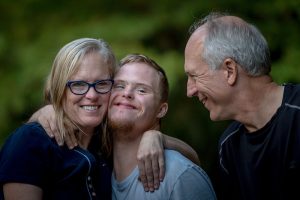What are rights?
All people have rights. A right allows you to have or do something.
Rights of People living with Disability
People living with disability have all of the same universal human rights as people living without disability. To understand many of the broad human rights that apply to all people, it can be helpful to understand the Universal Declaration of Human Rights which is the international standard of human rights.

Universal Declaration of Human Rights
Around the world many countries follow the Universal Declaration of Human Rights (UDHR) which outlines what rights people have. In Australia, we have not formally agreed to the UDHR, but Australian law does follow many of its rules. Human Rights include people with disability, they are rights for “everyone”, and without discrimination of “any kind”.
Basic human rights state that everyone has the right to freedom:
- of life, liberty and security of their person.
- of thought, conscience and religion
- to change their religion or belief and to manifest his religion or belief in teaching, practice, worship and observance.
- of opinion and expression; this right includes freedom to hold opinions without interference and to seek, receive and impart information and ideas through any media and regardless of frontiers.
- of peaceful assembly and association, and no one may be compelled to belong to an association.
- for motherhood and childhood to be entitled to special care and assistance.
- for all children, whether born in or out of wedlock, shall enjoy the same social protection.
Human rights also state that no one shall be subjected to:
- slavery or servitude; slavery and slave trade shall be prohibited in all forms.
- torture or to cruel, inhuman or degrading treatment or punishment
- arbitrary arrest, detention or exile.
- arbitrary interference with his privacy, family, home or correspondence, nor to attacks upon his honour and reputation.
Living Arrangements – Everyone has the right:
- to their nationality and no one shall be arbitrarily deprived of their nationality, nor denied the right to change their nationality.
- to freedom of movement and residence and the right to leave any country, including their own, and to return to their country.
- to seek and to enjoy in other countries asylum from persecution.
- to have their family recognised as the natural fundamental group unit of society which is entitled to protection by society and the State.
- to own property alone as well as in association with others and no one shall be arbitrarily deprived of their property.
- to a standard of living adequate for the health and well-being of themself and of their family, including food, clothing, housing and medical care and necessary social services, and the right to security in the event of unemployment, sickness, disability, widowhood, old age or other lack of livelihood in circumstances beyond their control.
- to freely participate in the cultural life of the community, to enjoy the arts and to share in scientific advancement and its benefits.
Marriage – All people:
- of full age, without any limitation due to race, nationality or religion, have the right to marry and to start a family.
- in marriages are entitled to equal rights.
- shall enter into marriage only with the free and full consent of the both spouses.
Law – Everyone:
- has the right to recognition everywhere as a person before the law.
- is equal before the law and are entitled without any discrimination to equal protection of the law.
- is entitled to equal protection against any discrimination in violation of their rights.
- has the right to go to a tribunal to address any acts that violate their fundamental rights.
- is entitled to a fair and public hearing by an independent and impartial tribunal in the determination of their rights and any criminal charge against them.
- charged with a criminal offence have the right to be presumed innocent until proved guilty, according to law in a public trial with defence.
- has the right to take part in the government of his country, directly or through freely chosen representatives. Everyone has the right to equal access to public service in their country.
Work – Everyone:
- has the right to work, to free choice of employment, to just and favourable conditions of work and protection against unemployment.
- without any discrimination, has the right to equal pay for equal work.
- who works has the right to just and favourable remuneration, ensuring for themself and their family an existence worthy of human dignity and supplemented, if necessary, by other means of social protection.
- has the right to form and to join trade unions for the protection of their interests.
- has the right to rest and leisure, including reasonable limitation of working hours and periodic holidays with pay.
Education :
- Everyone has the right to education. Education shall be free, at least in the elementary and fundamental stages.
- Elementary education shall be compulsory. Technical and professional education shall be made generally available and higher education shall be equally accessible to all, on the basis of merit.
- Education shall be directed to the full development of the human personality and to the strengthening of respect for human rights and fundamental freedoms. It shall promote understanding, tolerance and friendship among all nations, racial or religious groups, and shall further the activities of the United Nations for the maintenance of peace.
- Parents have a right to choose the kind of education that shall be given to their children.
For more information on disability rights in Australia visit the Australian Human Rights Commission website click here, or download their brochure click here.

Disability Discrimination
The Disability Discrimination Act 1992 (Cth) protects individuals across Australia from unfair treatment in many parts of public life and ensures that their rights can be followed. The Act makes disability discrimination unlawful and promotes equal rights, equal opportunity and equal access for people with disabilities.
The Disability Discrimination Act 1992 has as its major objectives to:
- eliminate discrimination against people with disabilities
- promote community acceptance of the principle that people with disabilities have the same fundamental rights as all members of the community, and
- ensure as far as practicable that people with disabilities have the same rights to equality before the law as other people in the community.
If you have a disability, the Act protects you against discrimination in many areas of public life, including:
- employment – getting a job, terms and conditions of a job,training, promotion, being dismissed
- education – enrolling or studying in a course at a private or public school, college or university
- accommodation – renting or buying a house or unit
- getting or using services – such as banking and insurance services, services provided by government departments, transport or telecommunication services, professional services like those provided by lawyers, doctors or tradespeople, services provided by restaurants, shops or entertainment venues
- accessing public places – such as parks, government offices, retaurants, hotels or shopping centres
The Act also protects you if you are harassed, because of your disability, in employment, education or in getting or using services.
For more information on the Disability Discrimination Act the Australian Human Rights Commission has many resources on thier website click here, or to download their brochure on your rights in Australia click here.
If you experience discrimination you can complain in writing to the Australian Human Rights Commission. If you are unsure if you can make a complaint about something, you can contact the Commission’s Complaint Information Service by phone on 1300 656 419 or by email to complaintsinfo@humanrights.gov.au
You can also contact Australian Human Rights Commission via the Translating and Interpreting Service: 131 450 or www.tisnational.gov.au or the National Relay Service: 1300 555 727 (Speak and Listen) or www.relayservice.gov.au
For more information on finding help for discrimination go to the My Rights Help – Discrimination section of this guide.

United Nations Convention on the Rights of People with Disabilities (UN CRPD)
The Convention states that:
- People are free to make their own choices
- No one will be discriminated against
- People with disability have the same rights to be included in society as anybody else
- People with disability are to be respected for who they are
everyone should have equal opportunities, including women and children
What countries should do to support the UN CRPD
All countries should make sure that people with disability get treated equally, by:
- Making laws to give people with disability their rights and changing any laws that are not fair
- Making sure the rights of people with disability to be treated equally are inlcuded in all policies
- Not doing things that are against this agreement
Countries should give people information and agree to do things to make everyone else aware that people with disability have the same rights as everyone else and to show them what people with disability can do by:
- Having campaigns to change the way some people think about the way people with disabilities live
- Showing everyone what jobs people with disability can do
- Teaching all children about equal rights for people with disability
- Getting the media to show people with disability properly
- Supporting more disability awareness work
Accessibility
- Countries should make sure people with disability have better accesss to things in all areas of life
- There should be better access to public buildings like hospitals and schools, and transport
- There should be better access to information
- Signs should be in easy read and Braille
- More guides and sign language interpreters should be available in public buildings
- There should be guidelines about how to have better access to public services
- Anyone provideing services should plan for good access for people with disability
- Accessibility training should be given
- They should make sure that people with disability have access to new technology
To access an easy read version of the UN Convention (UN CRPD) click here.





